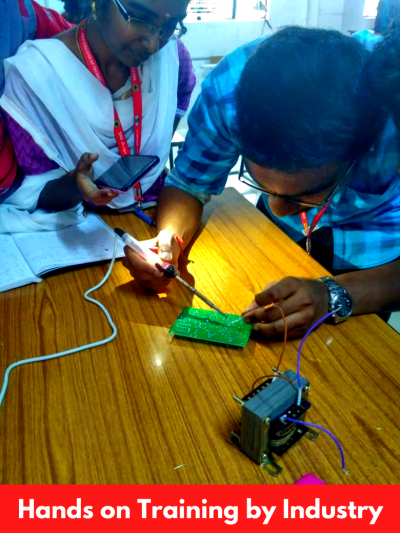
Benefits
- To ensure a heightened level of clarity and focus in institutional functioning towards quality enhancement and internalization of the quality culture NAAC for Quality and Excellence in Higher Education.
- To promote measures for the functioning of the Institution towards quality enhancement through initialization of quality culture and Institutionalization of best practices.
- To provide a sound basis for decision making to improve Institutional functioning.
- To act as a dynamic system for quality changes in the Institution.
- To build a better internal communication.
IQAC
internal Quality Assurance cell
The Internal Quality assurance Cell (IQAC) has been established in the College at the instance of the National assessment and accreditation Council (NAAC) as a post accreditation quality sustenance measure. The NAAC proposes that every accredited Institution should establish an Internal Quality Assurance Cell (IQAC) as a post-accreditation quality sustenance measure. Since quality enhancement is a continuous process, the IQAC will become a part of an Institution’s system and work towards realizing the goals of quality enhancement and sustenance. The prime task of the IQAC is to develop a system for conscious, consistent and catalytic improvement in overall performance of the Institutions. The IQAC will make a significant and meaningful contribution in the post-accreditation phase of the Institution. During the post-accreditation period, the IQAC will channelize all efforts and measures of the Institution towards promoting its academic excellence.
functions
- Development and application of quality benchmarks/ parameters for the various academic and administrative activities of the Institution.
- Arrangement for feedback responses from students, parents and other stakeholders on quality-related processes of the institution.
- Dissemination of information on the various quality parameters of higher education.
- Documentation of the various programmes/activities leading to quality improvement.
- Organization of workshops, seminars on quality related themes and promotion of quality circles.
- Preparation of the Annual Quality Assurance Report (AQAR) to be submitted to NAAC based on the quality parameters.
Objectives
- To ensure continuous improvement in the entire operations of the Institution.
- To ensure stakeholders connected with higher Education, namely parents, teachers, staff, would be employers, funding agencies and society in general, of its own quality and probity.
Monitoring team
committee members
The institutions need to submit yearly the Annual Quality Assurance Report (AQAR) to NAAC. A functional Internal Quality Assurance Cell (IQAC) and timely submission of Annual Quality Assurance Reports (AQARs)
INDUSTRY BASED CURRICULUM & COLLABORATIVE ACTIVTIES

Objectives of the Practice
- To innovate upon and refresh the curriculum to reflect the latest developments in technology and trends within industry.
- To integrate pure academics and pervasive industry engagement.
- To provide students with skills for employment and imbibe positive work ethics needed to meet the demands of the changing industry and global environment
- To enhance learning experience by participating in the Industry-integrated Collaborative Learning.
- To enhance learning by incorporating experimental and experiential learning.
The Context
- Design of industry based curriculum, development of laboratories in collaboration with industries
- Establishing industry interaction through Industry Institute Participation Cell [IIPC]
- Imparting in-plant training/internship/industrial training to students and faculty members at industries
- Inviting more people from industry to deliver Guest lectures
- Conduct workshops/Seminars/FDPs/STTPs in association with industry
- Industrial Projects and Consultancy works
- Organizing HR Conclaves /HR meets to provide platform for students to have close interaction with HRs/Technical experts from reputed industries.
- Collaboration with academic institutions and others for mutual benefit.
The Practice
- Industry based Curriculum: In the curriculum few courses are exclusively framed in consultation with MOU signed industries (Infosys Campus Connect) to meet their current requirements for making the graduates industry ready from day one onwards.
- Industry internship: The college introduced industry internship as integral part of its curriculum. Each student has to do an industry internship before he graduates.
- One Credit Courses: Students can also opt for one credit industry-oriented courses for a minimum of 15 hours duration, which will be offered by experts from industry on specialized topics apart from the prescribed courses of study of the programme. Experts from the industry may design such specialized one-credit courses based on the current technical skill requirements. Students can complete such one credit courses during the semesters from IV to VII.
- Faculty exchange and development Interaction of faculty members with the industry creates a platform for learning advanced tools and practices in the industry. Faculty members regularly visited various academic institutions and industries regularly to share and enhance their knowledge and to equip the students in the relevant fields.
- MoUs: The college has signed more than 250 MoUs with both National and International Industries/Universities. The college has signed MOU with Kyungpook National University, South Korea for collaboration.

Activity Based Students’ Centric Learning
Objectives of the Practice
- Develops independent and teamed up thinking skills.
- Develops communication and social skills.
- Encourages alternative methods of assessment.
- Helps students transfer skills to the real world.
- Promotes intrinsic motivation to learn.
The Context
SNS College of technology stands on its goals to achieve the vision of quality education and student centered learning using activity based method. The Activity Based Learning (ABL) method uses student-friendly educational aids to foster self-learning and allows students to study according to his or her aptitude and skill. Activities in each milestone include understand a concept. Activity Based Teaching Learning (ABTL) is an effort to overcome the limitations of traditional mode of course delivery. Progressive pedagogical models are used for the enhancement of course learning. To meet the objective different activities are designed and practiced along with class room teaching.
The Practice
It is a real challenge to make the students strong in their theoretical concepts to carry out projects. To facilitate this project based approach, learning through activities is practiced in the classes. The issues are addressed by adopting activity based pedagogical teaching learning practices. The framework of pedagogical activities designed and practiced in teaching learning includes several activities: icebreakers, warm up sessions, mid lecture wake up activities, game based learning, worksheets, simulations, one minute talks, group discussions, hourly plans, think pair and share, case studies, implementation assignments, quizzes etc.




